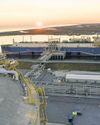CATEGORIES
Kategorien

HOW TIKTOK GREW FROM A FUN APP FOR TEENS INTO A POTENTIAL NATIONAL SECURITY THREAT
If it feels like TikTok has been around forever, that's probably because it has, at least if you're measuring via internet time. What's now in question is whether it will be around much longer and, if so, in what form?

TRUMP TO ANNOUNCE NEWLY FORMED PARTNERSHIP INVESTING $500B IN AI
President Donald Trump is announcing investments worth up to $500 billion for infrastructure tied to artificial intelligence by a new partnership formed by OpenAl, Oracle and SoftBank.

TRUMP RESCINDS BIDEN'S EXECUTIVE ORDER ON AI SAFETY IN ATTEMPT TO DIVERGE FROM HIS PREDECESSOR
Hours after returning to the White House, President Donald Trump made a symbolic mark on the future of artificial intelligence by repealing former President Joe Biden's guardrails for the fast-developing technology.

BANNING CELLPHONES IN SCHOOLS GAINS POPULARITY IN RED AND BLUE STATES
Arkansas’ Republican Gov. Sarah Huckabee Sanders and California's Democratic Gov. Gavin Newsom have little in common ideologically, but the two have both been vocal supporters of an idea that’s been rapidly gaining bipartisan ground in the states: Students’ cellphones need to be banned during the school day.

LEWIS HAMILTON ARRIVES IN MARANELLO FOR HIS 1ST DAY AT FERRARI
Seven-time Formula 1 champion Lewis Hamilton arrived at Ferrari's headquarters this week to get down to work with his new team.

'ONCE IN A LIFETIME' SNOW HITS PARTS OF THE U.S. SOUTH
A winter storm sweeping through the U.S. South on Tuesday was dumping snow at levels millions of residents haven't seen before.

WHAT'S NEXT FOR EVS UNDER PRESIDENT TRUMP?
President Donald Trump signed an executive order promising to eliminate what he incorrectly labels “the electric vehicle mandate” imposed under former President Joe Biden. His order on Monday is consistent with pledges Trump made on the campaign trail to end what he calls a “preposterous” focus on EVs by Biden and other Democrats.

NETFLIX'S BET ON LIVE EVENTS HELPED REEL IN 19 MILLION MORE SUBSCRIBERS IN HOLIDAY-SEASON QUARTER
Netflix added nearly 19 million subscribers during the holiday-season quarter to help propel its earnings beyond analysts' projections, capping the video streaming service's best year yet in a sign that its expansion into live programming is paying off.

UK WATCHDOG TARGETS APPLE, GOOGLE MOBILE ECOSYSTEMS WITH NEW DIGITAL MARKET POWERS
Google's Android and Apple's iOS are facing fresh scrutiny from Britain's competition watchdog, which announced investigations Thursday targeting the two tech giants' mobile phone ecosystems under new powers to crack down on digital market abuses.

TIPS ON OVERCOMING THE LOSS OF CHERISHED. PERSONAL BELONGINGS IN DISASTERS
Losing important sentimental belongings—those items that represented who you are—can be traumatic for those who go through disasters that destroy homes. Some tips on how to get through it, emotionally and practically:

Evolution - SHAPING THE NEXT WAVE OF APPLE TECHNOLOGY IN 2025
Apple faces a pivotal year in 2025, balancing innovation with market pressures. Efforts in mixed reality, Apple’s generative Al project, the company’s 2030 carbon-neutral pledge, and growth in its services division with platforms like TV+ will all play a role in elevating the firm.

TRUMP, A POPULIST PRESIDENT, IS FLANKED BY TECH BILLIONAIRES AT HIS INAUGURATION
Some of the most exclusive seats at President Donald Trump's inauguration on Monday were reserved for powerful tech CEOs who also happen to be among the world’s richest men.

HOW SCIENTISTS WITH DISABILITIES ARE MAKING RESEARCH LABS AND FIELDWORK MORE ACCESSIBLE
The path to Lost Lake was steep and unpaved, ou lined with sharp rocks and holes.

GOVERNOR PROPOSES BANNING CELLPHONES IN SCHOOLS THROUGHOUT NEW YORK STATE STARTING NEXT FALL
Students throughout New York state might have to give up their cellphones during school hours starting next fall under a proposal announced Tuesday by Gov. Kathy Hochul.

MUSK CLASHES WITH OPENAI CEO SAM ALTMAN OVER TRUMP-SUPPORTED STARGATE AI DATA CENTER PROJECT
Elon Musk is clashing with OpenAI CEO Sam Altman over the Stargate artificial intelligence infrastructure project touted by President Donald Trump, the latest in a feud between the two tech billionaires that started on OpenAl's board and is now testing Musk's influence with the new president.

TESLA RECEIVES MORE THAN 100K MODEL Y JUNIPER ORDERS IN LESS THAN 2 WEEKS, STARTS PRODUCTION AT GIGA BERLIN AFTER SHANGHAI
Tesla (TSLA) has received over 100,000 orders for the new design-refreshed 2025 Tesla Model Y Juniper in just two weeks following its launch in key markets like China, Asia, Australia, and New Zealand. This overwhelming demand showcases Tesla's strong foothold in the global EV market and the immense popularity of its latest Model Y update.

AI EXPERIMENT IN HALFPIPE JUDGING AT X GAMES WILL GIVE SNOWBOARDERS A GLIMPSE INTO THE FUTURE
The X Games will experiment judging halfpipe runs this week in Aspen using artificial intelligence, the cutting-edge technology that could someday play a role in the way subjectively judged sports are scored.

SAMSUNG AIMS TO TURN ITS NEXT GENERATION OF GALAXY SMARTPHONES INTO AI COMPANIONS
Samsung is injecting another dose of artificial intelligence into its next lineup of Galaxy smartphones, escalating an effort to simplify people's lives while deepening their dependence on a device that accompanies them almost everywhere.

YOUR MONEY: 5 IDEAS FOR AVOIDING AN OVEREMPHASIS ON SHORT-TERM RESULTS
Recency bias is the tendency to place too much weight on the latest performance trends while giving short shrift to other factors, such as fundamentals, valuation, or long-term market averages.

BILL GATES I Coded While I Hiked as a Teenager. Was I On the Spectrum? Probably.
In an exclusive excerpt from his new memoir, the co-founder of Microsoft describes his 'lucky' adolescence and his parents' support for what he now sees as his own neurodivergence.

Even You Can Now Invest in SpaceX.But at What Price?
An ETF just got its hands on shares of the private company. Good luck figuring out what it’s worth.

Surfing Legend in Malibu, Victim of the Palisades Fire
Known locally as 'Crawdaddy,' he was determined to stay behind to protect his house, his cat and the life he loved-as he had done many times before.

Tesla Recalls 1.2 Million China Cars
Tesla China plans to fix 1.2 million China-made and imported vehicles with software issues, as a dozen carmakers recalled vehicles over safety concerns in the world's largest auto market.

President Sets Breakneck Pace To Try to Deliver on Promises
Four years after departing Washington, defeated and with the nation reeling from the attack on the Capitol, Donald Trump walked through the doors of the White House's South Portico as the 47th president.

Troops Readied for Border Deployment
The Pentagon on Friday readied more than 5,000 troops from high-profile warfighting units to deploy to the southwestern U.S., moving to fulfill President Trump's order to escalate the military role along the border.

President's Talk of a Giant Water Faucet Puzzles Californians
President Trump and California Gov. Gavin Newsom are talking fish and faucets again.

Not Even Trump Could Save This Energy IPO
U.S. liquefied natural gas exporter Venture Global couldn't have timed its initial public offering better: It comes just days after the Trump administration lifted an LNG-export permitting pause. But the company's sky-high pricing expectations are getting the cold shoulder from investors.

Can Spending Keep Up With Amex's Outlook?
The card giant has set a high bar for growth, but there is rising uncertainty about 2025

Why MAGA Folks Should Read Marx
Today's conservative populists will find sympathetic ideas about the failings of capitalism in the writings of the great communist philosopher.

The Star Who Couldn't Catch a Break Now Can't Stop Catching Touchdowns
Washington receiver Terry McLaurin suffered through a parade of journeyman quarterbacks to begin his career. Then rookie sensation Jayden Daniels changed the direction of the franchise.